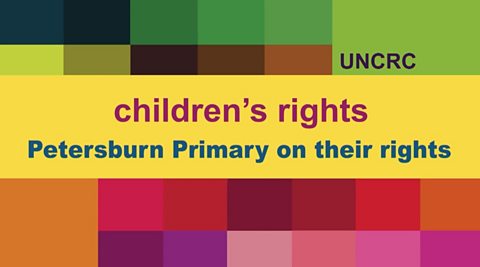Key information
The United Nations Convention on the Rights of the Child (UNCRC) is a list of rights that countries around the world have agreed that all children have.
Going to school is an important part of children's lives, so it is important that everyone in a school knows about and supports children's rights.
Working towards and earning a UNICEF UK Rights Respecting Schools Award is one way schools can make sure they are doing this. Using the UNCRC as a guide, UNICEF UK works with schools in the UK to create safe and inspiring places to learn, where children are respected, their talents are nurtured and they are able to thrive.
Since 20th May 2022 the Scottish Government has provided money for UNICEF UK to offer their Rights Respecting Schools programme to all state primary and secondary schools in Scotland.
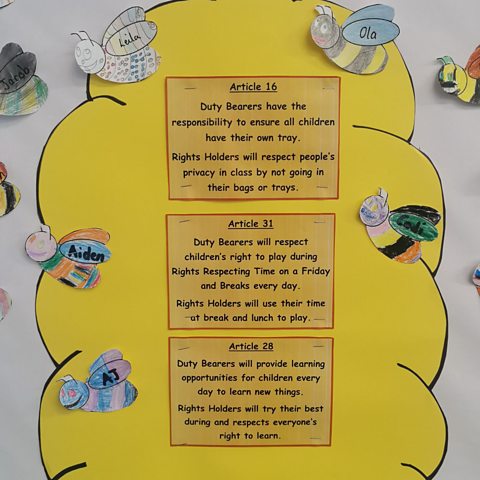
St Paulтs Primary School in Shettleston, Glasgow, was awarded the UNICEF UK Gold: Rights Respecting Schools Award in May 2021.
In this article you can:
- Find out about their journey to become a Gold Rights Respecting School
- Learn about some of the changes they made
- Discover how these changes impacted the school
- Learn what the pupils and parents think about the changes made

First steps to become rights respecting
One of the actions that the school took on its journey towards becoming a Rights Respecting School was to change its Behaviour Policy.
Pupils who were part of the Rights Respecting School steering groupA group of children and adults from across a school who take the lead in developing a plan and taking action to make a school better at putting children's rights into practice. interviewed classmates from Primary 1 to Primary 7 to ask for their views on this policy and how to make it better.
Parents were also asked for their views and the school made changes based on these suggestions. St Paulтs new policy is focussed on building positive relationships with children and their families rather than managing behaviour.
Focusing on positive behaviours
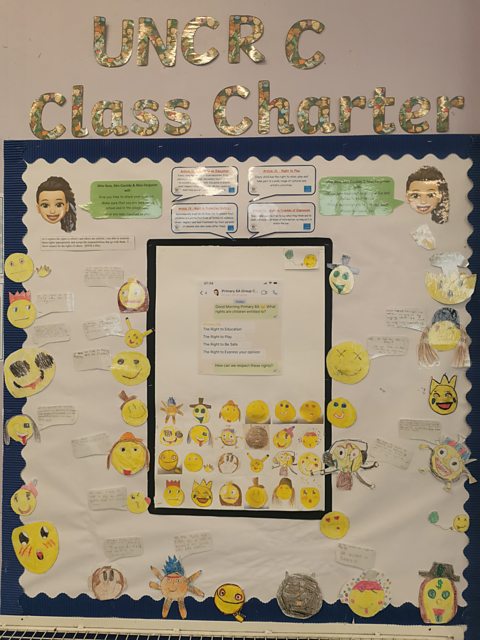
Creating positive relationships and supporting childrenтs rights are at the heart of everything that happens at St Paulтs.
All classes develop their own class charterA list of rules, promises and guidelines that pupils and teachers have agreed on for the classroom. at the start of the school year. They decide what adults and children should be doing to ensure that childrenтs rights are always being respected.
Each class now has a recognition boardA place for pupils to have their achievements marked and where they can celebrate their progress. and pupils work together to get a mark on the board and celebrate together as they achieve their targets.
A template for restorative conversationsA safe way to resolve any upset or conflict at school. Everyone is able to share their view knowing the teacher will help them find a solution and not look to blame anyone or hand out punishments has been introduced and children know that staff will support them to solve any disagreements with their classmates.

Improving mental health
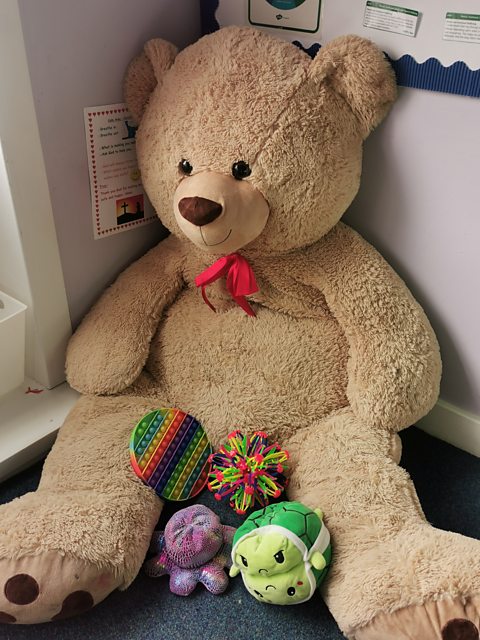
Childrenтs health and wellbeing is very important and it is supported in a number of ways at St Paulтs.
The schoolтs visible consistenciesActions that make sure everyone feels valued and treated the same as everyone else every day. mean that children are welcomed by name and with a hand clasp as they come into the playground each morning, and staff always speak to them in a тcalm, consistent and kindт manner.
When children come into class they use their emotional scaling chartA chart that allows children to show how they feel every day. A child can choose from a scale of numbers, traffic light colours or faces with different expressions to show how they feeling. This helps the teacher understand their mood and help them get the most out of their day.. to let their teacher know how they are feeling and if they are ready to learn.
bubble timeTime when a child can talk with their teacher privately without anyone interrupting. can also be used to alert staff if a child wishes to speak with them privately. There is a calm area, including life-sized teddy bear, in every classroom where children can go if they are feeling upset or worried.

Breaking down barriers
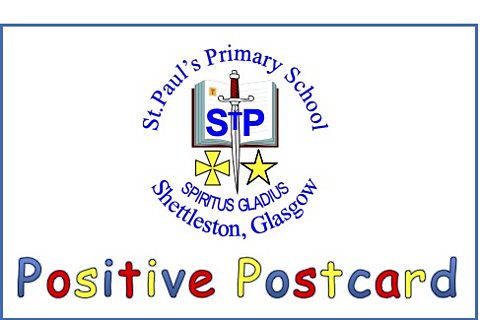
Better communication between the school and parents or carers helps build positive relationships with families. This includes more face-to-face and telephone contact between parents and class teachers. The focus is on what children are doing well.
have been introduced. One is given out by each member of staff every week. These postcards let parents and carers know that their child has gone тover and aboveт in their behaviour that week.
The idea is to celebrate pupils who have done something тabove and beyondт basic good behaviour, working hard or doing well in a test, for example by being particularly kind to other people or volunteering and taking time to help others.

Right to be heard
Children now know that they have the right to have their voices heard and speak out for their rights and the rights of all children.
For example when they were unable to play on the school pitches after lockdown due to broken glass and dogsт dirt, Primary 6 and 7 children led a successful campaign to get the pitches cleaned up and make sure they were only being used by school pupils.
What the children think
Children and parents at St Paulтs have welcomed the changes brought around by the Rights Respecting Schools Award and had this to say about it.
We learn about our rights. It makes us feel safe and it makes us feel happy.
You get listened to and there are more nice people in this school.
If you feel sad or something, you can talk with your teacher and they will make you feel better.
What the parents think
I like managing behaviour without the threat of discipline.
I like the fact that children know their rights and are confident enough to voice their opinions.
I think this is useful for all members of the school community and will have a positive impact on attainment.
The journey to becoming a Gold Rights Respecting School will be different for each school; these are just some examples of the positive changes that can be made.
Further learning: links for teachers, parents and carers
There is more information on on the UNICEF UK website.
More on Children's Rights
Find out more by working through a topic
- count3 of 3
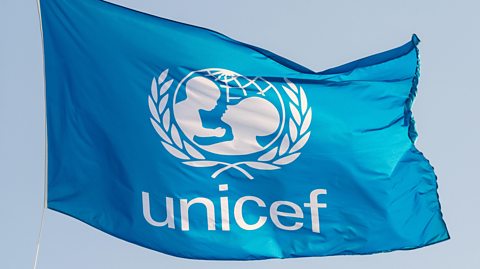
- count1 of 3
